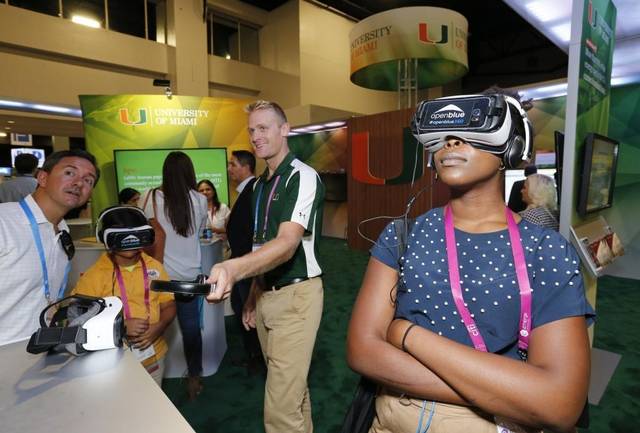By Nancy Dahlberg
The Miami Herald
WWR Article Summary (tl;dr) The future of artificial intelligence, big data and cybersecurity are just some of topics being tackled this week at “eMerge Americas”, a two day tech conference in Miami connecting innovators, investors and thought leaders.
The Miami Herald
Call it Tech Tuesday at eMerge Americas.
While Day One of the homegrown technology conference at Miami Beach Convention Center was a mix of tech and politics, tech and startups took the spotlight on the conference’s second and final day.
Quite literally. Startups pitched on center stage throughout the day, competing for $175,000 in prizes — and investor attention, while hundreds of people milled around their tables.
They also took in talks by some of the industry’s top entrepreneurs on topics including artificial intelligence, big data and cybersecurity.
The secretive Magic Leap has yet to reveal its highly anticipated product. But founder Rony Abovitz, whose Plantation-based company has brought in $1.4 billion in venture capital, described Magic Leap as an effort to experience the world more naturally.
“We’re trying to build a computer that acts like people, so you don’t have to look at your phone all the time,” he said, in an on-stage discussion with Matt Haggman, Miami program director of the Knight Foundation, and Jean-Pierre Bardet, dean of the University of Miami’s College of Engineering.
While Magic Leap used to call its technology “mixed reality” — something like augmented reality, but different — Abovitz said he now prefers describing it as “spacial computing powered by a digital lightfield.” Translation: It will allow computing to become part of you.
Magic Leap is believed to be creating a wearable device such as glasses. But for the people who came to the talk wanting to know when they can get their hands on it, Magic Leap remained, well, vague, saying only that its first product launch is “not far away” and that pricing was aimed at “affordability in the mass premium category. … It’s not a Kindle kind of pricing but it’s not unattainable.”
Uri Levine, co-founder of the popular Waze, described the traffic app as “a social network for driving.” Everything on the app was created by the driver, he told the audience. “We the drivers help other drivers avoid the traffic jams we are in. This is the magic of Waze.”
For the many entrepreneurs on hand, he said launching a startup is like falling in love. “Fall in love with the problem you are solving, not your solution,” he advised.
Focus is key too; if an entrepreneur loses focus of the central problem he is solving, he won’t be building the right thing. Timing helps: Waze started on a PDA — remember those? — but the smartphone enabled scale.
Startups he is involved in now include Moovit, an app similar to Waze but for public transit; Engine, technology that runs ongoing diagnostics on a car and gets repair quotes; and Solomoto, an all-in-one platform for small businesses.
What was his best startup? “The next one.” His advice for Miami entrepreneurs: to solve the high cost of U.S. healthcare.
The recent Wannacry hack put the ever-hot topic of cybersecurity on high boil. On Tuesday, eMerge founder Manny Medina unveiled details about his latest venture, Cyxtera Technologies.
The “giant startup,” as he called it, combines 57 data centers and four cybersecurity-and-data analytics companies that already serve 3,500 customers with 1,100 employees.
“We believe the next revolution is the era of cybersecurity. We believe security has to be adaptive and intelligent … but also made for the cloud,” Medina said. “This is a giant opportunity and we are in the forefront and it will be based in Miami.”
The conference’s final keynote came from a celebrity investor better known for baseball than business.
Miami’s Alex Rodriguez — better known as A-Rod — started his business holdings with a Miami duplex 18 years ago; today his 400-employee company, Arod Corp., manages 15,000 housing units in 12 states.
And real estate is just one arm of his business; he also owns fitness centers and auto dealerships and holds investments in a number of ventures, including eMerge Americas.
Most recently, he has dived into the media world, a business Rodriguez called “fun and exciting but tough.” He said he’s proud to be the first Latino Shark on “Shark Tank,” he said.
“Every business I have has a huge digital component. As an entrepreneur, you always have to be looking around the corner. What’s next, what is the competition? Whoever figures out digital will be the winner.”
But not everything should be digitized, he said — including the sport that brought him wealth. Using the example of a player’s worth for instance, he said, “you need character, you need grit and you need toughness. And that cannot be appraised in a computer.”
Throughout the day, startup finalists in various categories took to the stages to pitch their products to investor judges.
The top prize of the conference went to later-stage company Voyhoy, a travel site that lets consumers compare and buy tickets combining transportation on bus, plane, train and ferries throughout Latin America.
Since launching in late 2015, Voyhoy has acquired more than 6 million users, and relocated to Miami to grow the business. Its prize: $100,000.
Chirrp, a multichannel platform for customer engagement, won the competition for early-stage companies, a prize worth $50,000. TSOLife, an online tool to help users record and share their stories for future generations, won the university category, worth $25,000.
At the high school level, eMerge partner Network for Teaching Entrepreneurship awarded its first-place prize of $2,500 to fashion business AmberAsh, created by Ashley Bellinger.














































































































































































































































































































































































